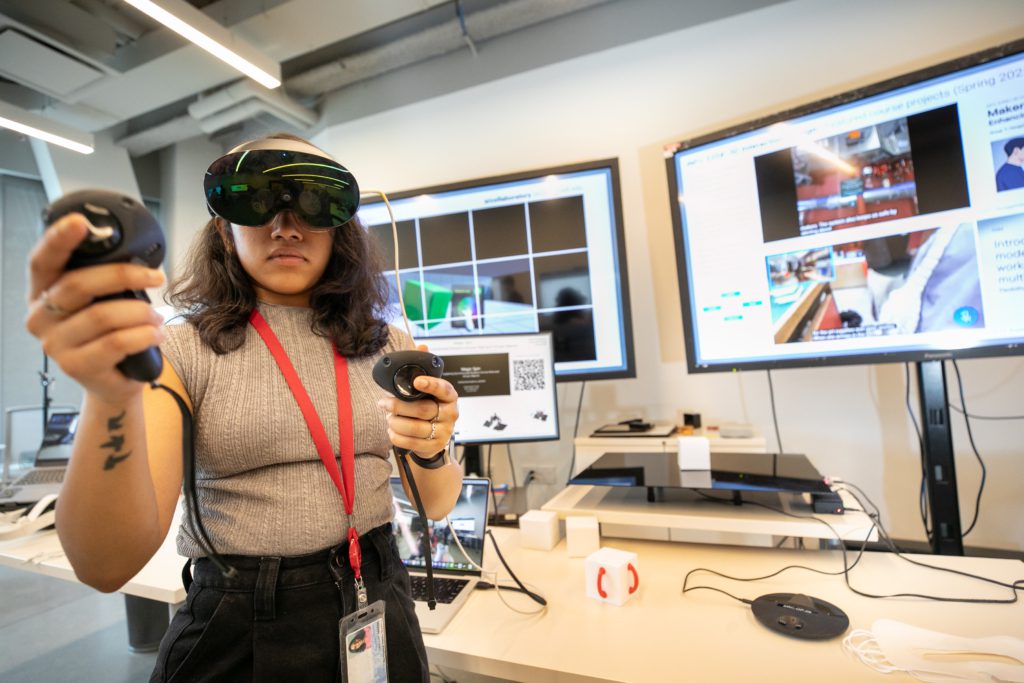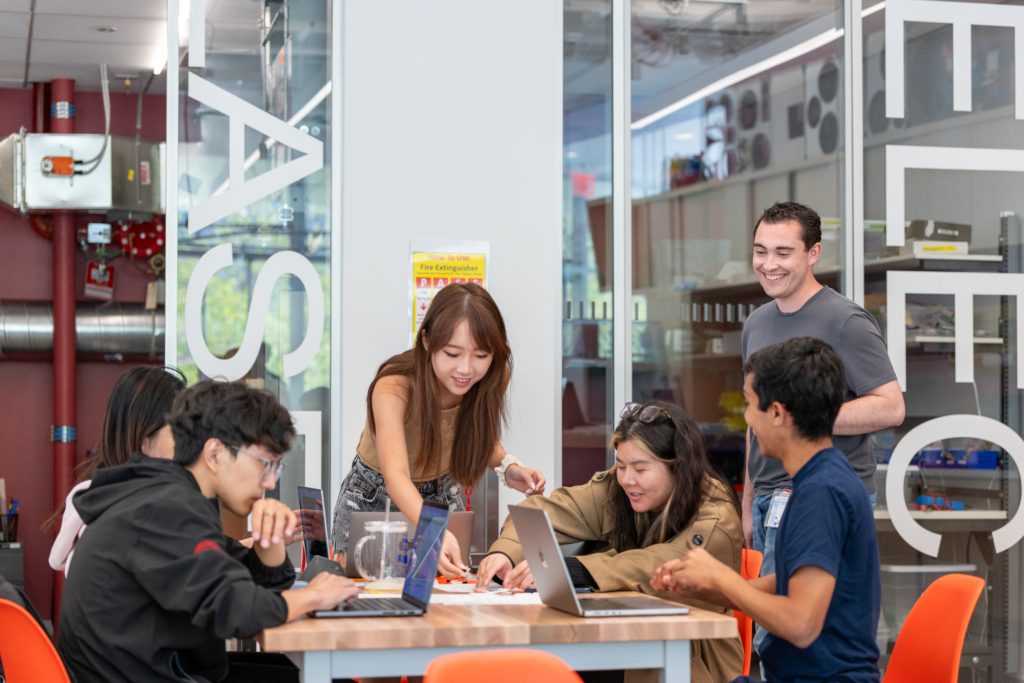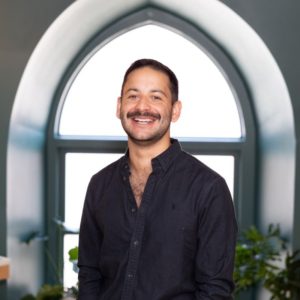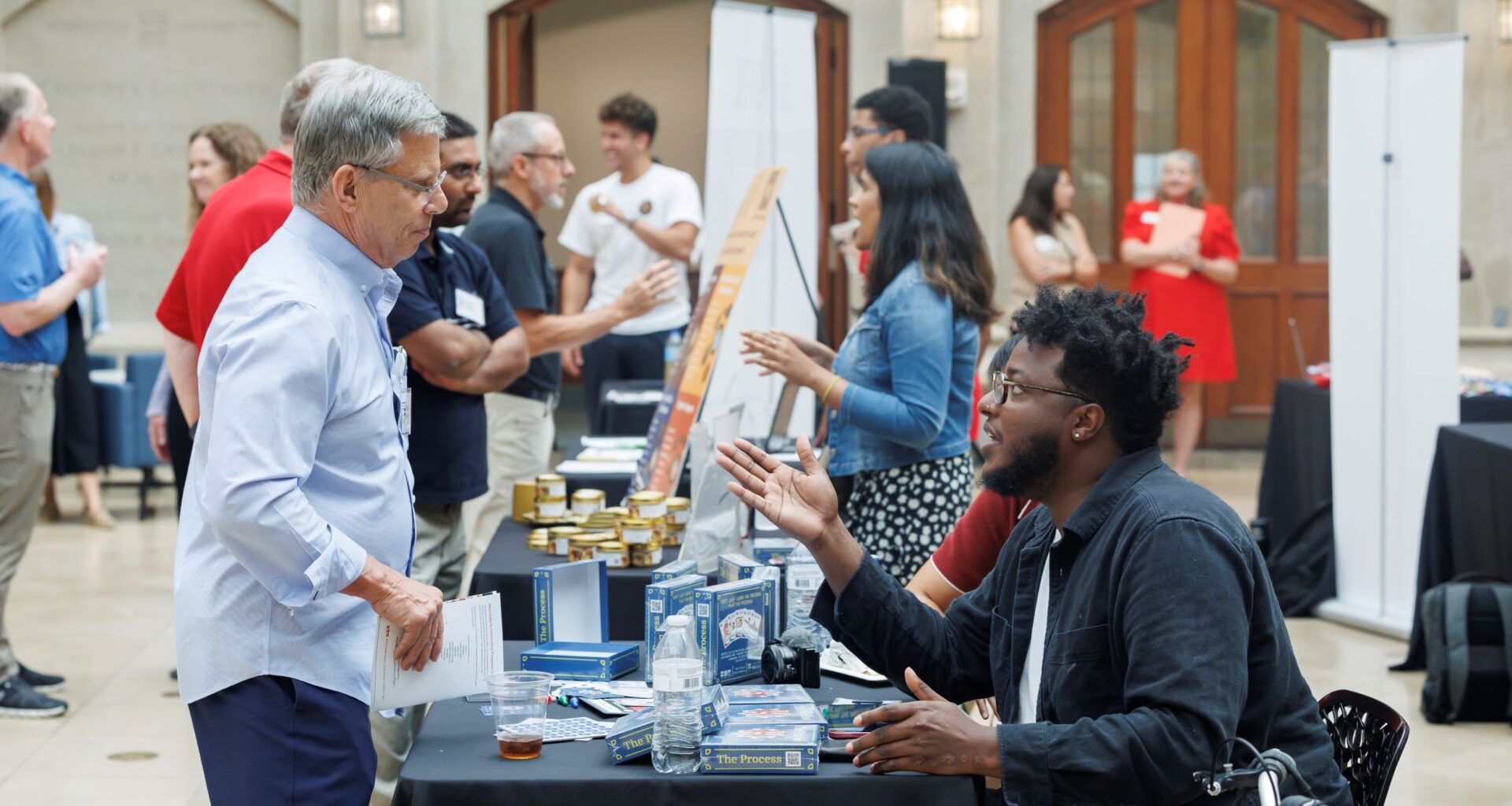
A student presents their VR project in the XR Collaboratory during Cornell Tech’s Startup Awards + Open Studio 2025
THE SECRET SAUCE OF THE CORNELL TECH MBA
Launched in 2014, the one-year Johnson Cornell Tech MBA is a collaboration between Cornell Tech and the Samuel Curtis Johnson Graduate School of Management at the SC Johnson College of Business. It’s essentially an Ivy League experiment in building ventures at the intersection of business, technology, design, and law.
It is located on Cornell’s applied science campus on Roosevelt Island which looks more like a startup campus than a business school. Glass walls reflect both the clouds and the New York skyline across the East River.

Manoj Thomas, Associate Dean of New York City Initiatives
It has a simple but ambitious mission, according to Manoj Thomas, Demir Sabanci Professor of Marketing and Management and Associate Dean of New York City Initiatives.
“We aim to be the first choice for MBA students who want to create startups, not just in the country but in the world.”
Students spend eight credits in multidisciplinary Studio courses, the experiential backbone of Cornell’s entrepreneurship curriculum. Students apply each lesson to a real venture, often a startup or product they’re building themselves. Throughout the semester, they move their ideas forward during dedicated maker days and bootcamps. They receive weekly feedback from coaches and industry professionals across Cornell and New York City’s tech scene.
In Product Studio, they test early ideas and learn product management; in Startup Studio, they refine ventures for market and pitch for real funding. MBAs work on teams with engineers, designers, and law students formed through Cornell Tech’s proprietary DreamTeam founder-matching system.
“You get everything you do in an Ivy League business school, plus the benefit of being co-located with world’s leading computer science and engineering groups,” says Thomas.
AI-FIRST BY DESIGN
In just its second year to participate in our MBA entrepreneurship ranking, the program shot up 10 points – the largest leap of the ranking – from No. 14 last year to No. 4 for 2026.
It was buoyed by the forth-highest five-year average of MBA founders (15.2%) immediately after graduation, and the third highest average of MBAs joining a startup (19.4%). It also had the highest percent of MBAs (100%) working directly with a startup during their program.
Cornell Tech offers up to $100,000 in pre-seed funding, incubator space, and ongoing institutional support for as many as five startups each year. Other student ventures often find backing through the broader Cornell and New York City venture networks, including Big Red Ventures, the Jonas Weill Fellowship, and Ignite Cornell Lab to Market.
The program is “AI-first,” Thomas says, with MBAs encouraged to use AI to build faster and go further. That philosophy runs through every part of the program:
Cornell Tech leverages the university’s AI expertise (ranked No. 2 globally in AI research in the CSRankings) to embed AI tools throughout the MBA and Studio curriculum.
It has developed two AI Bootcamps to demystify emerging technologies and teach students to identify opportunities across the “AI opportunity stack.”
The venture development process itself has evolved, favoring smaller teams, parallel experimentation, and rapid prototyping.
New coursework explores the intersection of technology and business, with electives such as Applied Machine Learning, Cryptocurrencies, Cybersecurity, Human-Computer Interaction, and Design.
In the past three years, the school has also added domain-focused bootcamps in HealthTech, AI, robotics, and human-centric design. It’s also created three entrepreneurship tracks: Startup Studio (for independent ventures), BigCo Studio (for corporate innovation), and PiTech Impact Studio (for public-interest tech ventures).

A group of six Cornell Tech students working on their Studio projects in the MakerLAB.
THE NEW YORK ADVANTAGE
At the heart is Cornell Tech’s “bias for action” and emphasis on scientific temperament – a conviction that building ventures is a discipline anyone can learn.
“You can just do things,” Thomas says. “In an AI-enabled world, where everyone can build, individuals who exhibit high agency – taking initiative, working through problems, and getting things done – will go much further and achieve seemingly impossible goals. Every part of our program is designed to enable high agency students to have a transformative real-world impact.”
Just ask David Stein.

David Stein, MBA 2020
The MBA Founder, class of 2020, chose Cornell Tech specifically for its Startup Studio and the chance to win pre-seed funding for his at-home health testing platform, Ash.
“It’s an ecosystem built for action. It’s not just academic; it’s a true incubator woven directly into the curriculum. You’re surrounded by engineers, designers, law students, and other business students who are all intensely focused on building real products, not just talking about theoretical case studies,” says Stein, Ash co-founder and CEO.
“There’s a tangible energy of ‘let’s build this now’ that permeates the entire campus.”
He came to campus with a problem to solve, one that was personal to him. As a gay man, he struggled to access sexual healthcare without feeling judged or shamed when trying to get tested. Many of his co-founders had similar experiences – long waits, limited access, and few options that made testing easy or comfortable. Ash started as an inclusive, accessible at-home STI testing option, especially for the LGBTQ community.
The company has since transformed into a full-fledged infrastructure partner for health organizations, offering white-label testing kits and digital touchpoints across more than 150 biomarkers, from fertility and kidney disease to cancer screening.
There wasn’t another MBA program at the time of Stein’s research that dedicated actual course time and seed funding to build his startup, he says. And there was another advantage that could not be overlooked: New York City.
Cornell Tech MBAs are surrounded by one of the densest innovation ecosystems in the world, headquarters to leading finance, media, healthcare, and technology companies all within steps from the nearest subway station.
Each year, hundreds of NYC-based founders, investors, and executives mentor students and judge Studio demos.
“Another massive strength is the interdisciplinary network. Having immediate access to mentors, advisors, and collaborators from the Parsons School of Design (where our co-founder Mio joined the program from), Weill Cornell Medicine, and the broader Johnson School was invaluable for a health-tech company like Ash,” he tells P&Q.
“That tight integration between tech, business, and medicine, all on one campus, is incredibly rare and powerful.”
NEXT PAGE: 2026’s Best MBA Programs For Entrepreneurship
© Copyright 2025 Poets & Quants. All rights reserved. This article may not be republished, rewritten or otherwise distributed without written permission. To reprint or license this article or any content from Poets & Quants, please submit your request HERE.

